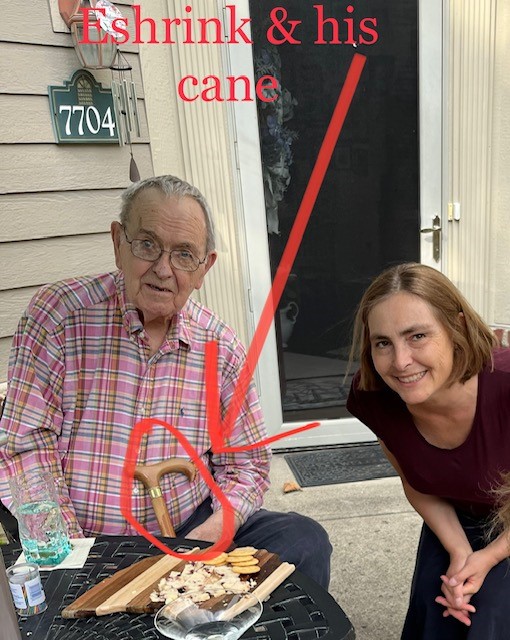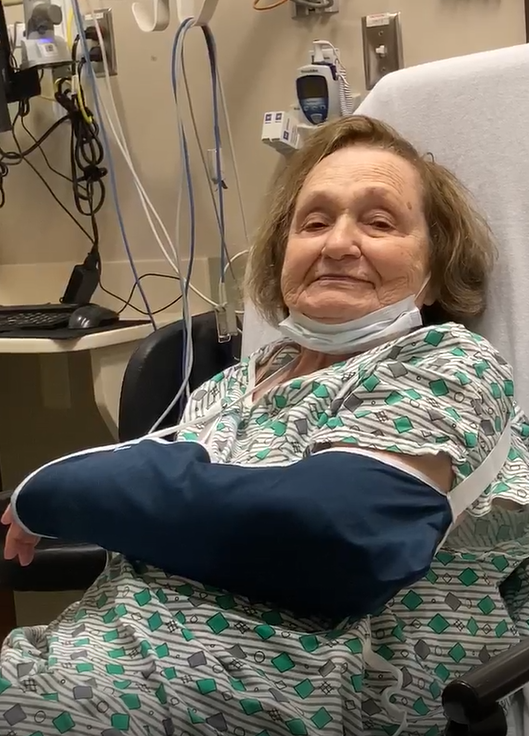
For the Past couple of years I have been using a cane. I am an old white guy, but I can’t help that (even though I realize that old white guys are not very popular these days). As a matter of fact, by today’s standards, I am a very old white guy, which gives me license to use that cane as an alternative to falling because we old guys of any color are prone to take a tumble…and the old gals, too. Falling is not a trivial event for old guys. Two of my closest friends, both old guys, have died from falls. According to the CDC the annual death rate from falls among those age 65 or above is 64 per 100,000. For those of us 85 and over that number is increasing by 4% each year. Falls are now the leading cause of accidental death in us old people in addition to massive numbers of debilitating injuries. I have fallen a couple of times in the past year, but fortunately have escaped serious injury.
That leaves me with little doubt that my cane has saved my life on multiple occasions by preventing me from falling, and since I very much like being alive and able to ambulate on my own, there is little wonder that I feel great affection for my cane. However, it serves a secondary, but no less important function. It facilitates love. My use of a cane has changed my relationships with my fellow humans in a very positive way. As an old, retired shrink, I am accustomed to observing other people while monitoring my own feelings, and I can attest to the fact that you are noticed when using a cane. I have been amazed at how often people will open a door or stand aside and motion me to move on ahead of them when in a line. If you appear to struggle a bit getting out of a chair, they frequently offer to give you a hand.
In my case becoming an old guy sneaked up on me, and I guess I was in denial for I had become rather gimpy before I finally relented and purchased a cane. There was also an unwillingness to accept help from strangers and a tinge of resentment for I am not only an old guy but consider myself to be a tough old guy! Who in the hell did they think they were by judging me to be a helpless old goat?
Could Caring Explain How Human Beings’ Dominated the Planet? Is it in our DNA?
Then one day I had a serendipitous experience in of all places a mall parking lot. With the help of my cane, I was attempting to pry myself from my car (which is always a struggle since my car is low to the ground) when a guy showed up asking if he could help. He quickly unstuck my foot and offered his arm to lift me out. I looked up to thank him and noted a look of what seemed genuine concern when he asked if I was OK. I was overwhelmed with a feeling of gratitude that this guy had gone out of his way to help me simply because he cared. I had a sense that he also felt good about the experience. I was left with a life changing insight (we shrinks like to use that word), as it suddenly occurred to me that without this type of interaction we humans would never have been able to survive let alone dominate the planet.
Who would have volunteered to help kill a mastodon if he didn’t think his buddies cared enough to cover his back? A few thousand years later, we are now even more dependent upon others in order to survive the vicissitudes of modern life in a complex society. We have evolved to the extent that concern for our brethren has become a part of us and is encoded in our DNA. In that vein, I found it interesting that in a study of recipients of the Carnegie Medal for Bravery, all reported they acted upon impulse without thought of the consequences. Check out the article and videos here.
Human Connection Saves Lives
It has also become an important factor in our emotional and mental health. The feeling of being unloved was at the heart of many of my patients’ troubles often leading to poor self-esteem, depression, and unhealthy relationships, even anger and violence, but even worse is the conviction that one is unlovable which may result in the hopelessness we associate with suicidal behavior. I find it interesting that many of the mass killings we witness are perpetrated by males who are characterized as “loners” (i.e., those, who for whatever reason, feel alienated). It has been shown that total isolation for even a few weeks may result in psychotic decompensation even in apparently healthy individuals. Politicians are only successful when they convince voters that they care about them.
Soldiers who have been in combat often demand to be sent back into battle with their former comrades because of their concern for them, and that killing enemies is necessary to protect their buddies. We learned from the debacle of the Romanian babies born in orphanages behind the iron curtain that children cannot thrive in an atmosphere without personal loving interaction. We even have empathy for those poor souls more than a thousand miles away in the Ukraine. However, these are only a few of the myriad ways that caring about each other enters virtually every aspect of our lives. Furthermore, they provide evidence that such interactions are not only pleasurable but essential for our well-being and to life itself.
Love. Lust. And Caring.
Love is an oft used word which is used and at times misused to describe feelings of affection. Poets, philosophers, theologians, musicians, artists, and shrinks of all stripes have long been attempting to define it. They categorize it according to the initial stimulus which precipitated the feeling. For example, one would not equate lust with love unless it was accompanied by a feeling of affection i.e. caring for more than just the person’s body. Nevertheless, it is often lust that gets the potential lover’s attention. As he investigates further, he may find other things he likes, and the courtship begins which is his attempt to demonstrate that he is loveable. If he is successful, they fall down the rabbit hole together and live happily ever after (excuse me for using only one gender for any combination may apply). The lovers have learned to enjoy and consequently value each other’s company. In other words, they care about each other.
Although I don’t mean to equate my cane to lust, the cane does get people’s attention, and is the impetus to a brief but caring relationship, which I submit is the basic ingredient of love. Most religions extol the virtue of loving each other, and it is true that to do so would solve many of the world’s problems. To that end perhaps we should produce fewer guns and more canes.
P.S. Irony is alive and well at our house for in the midst of writing this elegant essay, I heard a loud scream and found Barb flat on the floor with a fractured wrist (the second time for that one), but she is doing well mow. Obviously, she pays little heed to my admonitions to be careful and not fall.
Editors Note: Eshrink wrote this blog weeks ago and I have been derelict in my editing/posting duties. When I visited mom and dad last week after the my BIG 40th High School Reunion Weekend with Annette, I took mom to follow-up appointment from the fall she had 4 weeks ago. She is healing well and such a trooper!

Well done by the writer and Mr. Cane in his careful caring of his owner.
LikeLike
Such great insights, Doc! I Hope Barb continues to heal completely.
LikeLike